While so many Disney and anime features are being remade these days, it’s nice to see animation that could never be adapted to live-action. Sure, with current technologies, anything can be replicated in “live-action” form, but the surreal and abstract collage of Masaaki Yuasa (Mind Game) just wouldn’t translate in a worthwhile manner. Much of his film The Night Is Short, Walk On Girl, for instance, would need to be faithfully re-created in a way that’d be redundant, or it’d just be stripped of its varied visual eccentricities and become a straight single-night adventure, like After Hours, which might be fine but would have nothing to do with the original.
Watching something as unique as The Night Is Short, Walk On Girl is like reading a book you know can only be a book. Just as many animated features can be looked at with inspiration for live-action counterparts, too many novels these days are written with the wish to be adapted to film (it’s a lucrative plan). Books for which you can say that you easily see them as a movie are not great. Being truly unadaptable is what marks perfection within a medium. Ironically, The Night Is Short, Walk On Girl is based on a successful illustrated novel, by Tomihiko Morimi (and does have ties to the Tatami Galaxy series also based on his work), but in the direction of Yuasa does seem exclusively suited to not just animation but his style of animation.
To a newcomer, Yuasa’s efforts here could maybe be described as like if Hayao Miyazaki wanted to be Ralph Bakshi instead of Walt Disney. There’s so much bizarre fantasy on display in the imaginative tale of a young woman’s long and winding night out in Kyoto, but in The Night Is Short, Walk On Girl it involves a lot of alcohol and pornography and long-legged men, none of which is likely influenced by Bakshi but can feel reminiscent of the famously X-rated animator’s early films to a Western viewer. Yuasa never goes anywhere that’s too unsafe for young audiences (that’s good in case any parents mistake US distributor GKIDS for solely putting out material for kids); even the many shunga (Japanese erotica) prints visible on screen are playfully censored.
The Night Is Short, Walk On Girl is, most simplistically in its plot, a romantic comedy about a Kyoto University student in love with a younger schoolmate, whom he tries to make think is fated to be with him. He has been intentionally running into her and claiming coincidence. Meanwhile, she’s oblivious but also lonely. Still, on the night followed through in the film, her goals have nothing to do with love. They are to learn to drink like a grown-up and attempt to find a favorite book from her childhood at a book fair. In the third act, she also gains a new task of visiting and caring for numerous characters as they come down with a serious cold going around the city.
In his pursuit of her, the young man, only known as “Senpei,” forcefully tries to be a part of the girl’s night. During the book fair, he learns of her quest and also seeks out the same treasure in order to woo her with it. There are genuine coincidences along the way, too. And also terrible results to his scheming, including his having to endure a spicy food eating contest as well as an incident of accidental indecent exposure witnessed by his crush — who is only ever referred to as “The Girl with Black Hair.” Between the two main characters, they encounter mythological spirits, a “pervert” erotica cult, and a man with his own romantic destiny subplot in which he’s long-sworn not to change his underwear until he again crosses paths with his mystery love.
The term “fever dream” is often used to describe animation like Yuasa’s and has been employed in many reviews of The Night Is Short, Walk On Girl, but it’s rarely so apt as it is here. Some of the wildest visuals come during the spicy food eating contest, when hallucinations form in the minds of characters in a fevered state while sweating through the consumption of “fire nabe” and hot dumplings and ramen. Later, all of the film’s characters save for the Girl with Black Hair are sick in bed, probably collectively causing more trippy apparitions. We see at least one of Senpei’s literal fever dreams, starring the Girl with Black Hair, of course,, and it’s just crazy and kaleidoscopic enough for us to know it’s not just part of the ongoing reverie.
The base romance story of The Night Is Short, Walk On Girl never connects in a compelling way, and anyway it’s sort of problematic in the same stalkery fashion as the plot of Amelie. Yet like that film, the whimsical and visionary storytelling here makes up for our lack of interest in the main characters coming together. All the strange stops along the way are worth traveling through, and even with Yuasa mixing up animation styles and unreal scenarios so frequently that it should keep the audience at a distance, this is a film with a full sense of its own space, and it marvelously absorbs and transports our imagination to the weird and wondrous world it’s selling.

